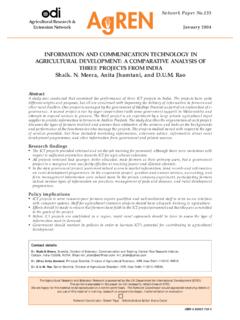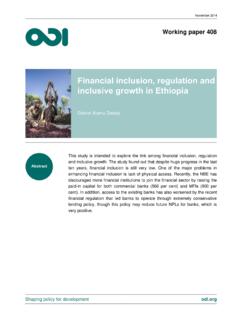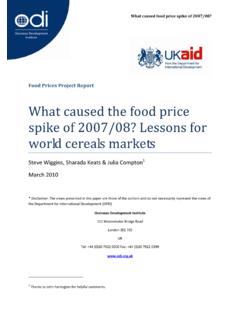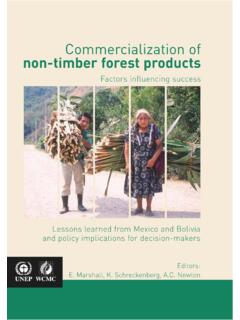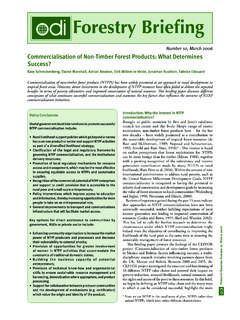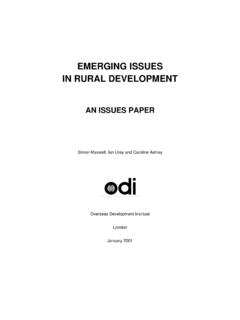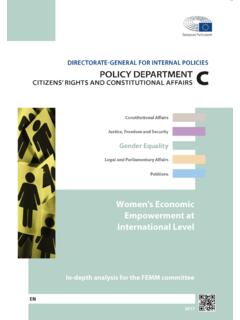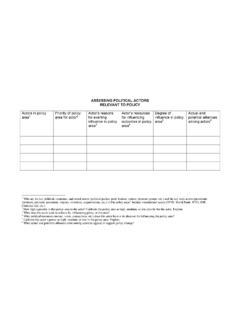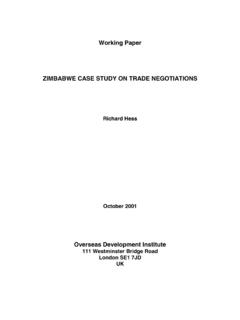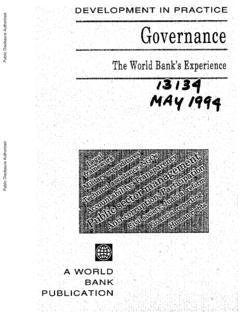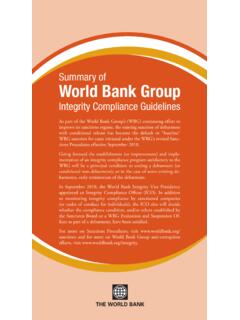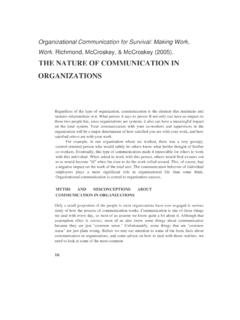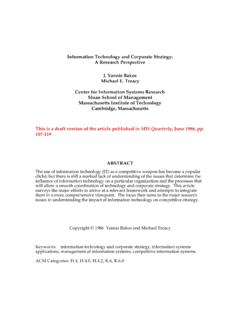Transcription of Knowledge Management and Organisational …
1 Working Paper 224 Knowledge Management and Organisational Learning: An International Development Perspective An Annotated Bibliography Ingie Hovland August 2003 Overseas Development Institute 111 Westminster Bridge Road London SE1 7JD UK ii ISBN 0 85003 684 4 Overseas Development Institute 2003 All rights reserved. No part of this publication may be reproduced, stored in a retrieval system, or transmitted in any form or by any means, electronic, mechanical, photocopying, recording or otherwise, without the prior written permission of the publishers. iiiContents Acknowledgements iv Acronyms v Executive Summary vi 1 Introduction 1 Background 1 2 Review of the Literature 3 Knowledge Management and learning in the corporate sector 3 Knowledge Management and learning in the development sector 5 3 Gaps in the Literature and Future Issues 12 Knowledge Management /learning and responsiveness 12 Knowledge Management /learning and impact on policy 13 Knowledge
2 Management /learning and impact of policy 14 Knowledge Management /learning and Southern engagement 15 4 Annotated Bibliography 17 Thematic index 59 Alphabetical index 63 List of Tables Table 1 Typology of work settings 17 Table 2 KM applications mapped to the six elements of the KM spectrum 21 Table 3 Organisational responses to error 35 Table 4 The two generations of KM strategies 41 Table 5 The shift from industrial to e-business 50 ivAcknowledgements The author would like to thank everyone who has shared documents and work in progress, including Kenneth King (CAS), Megan Lloyd-Laney (CommsConsult), Jawed Ludin (BOND), David Mosse (SOAS), Kath Pasteur (IDS) and Surmaya Talyarkhan (ITDG).
3 Thanks also to John Young at ODI for comments. Ingie Hovland is a research associate on the Research and Policy in Development (RAPID) programme at the Overseas Development Institute (ODI) and a PhD student in the Anthropology Department at the School of Oriental and African Studies (SOAS). Email: vAcronyms AM90s Africa s Management in the 1990s ( world bank research programme) BOND British Overseas NGOs for Development BP British Petroleum CAS Centre of African Studies (University of Edinburgh) CIDA Canadian International Development Agency CoP Community of Practice CSO Civil society organisation DANIDA Danish Ministry of Foreign Affairs DFID Department for International Development, UK EU European Union GDN Global Development Network GO Governmental organisation GTZ Agency for Technical Cooperation, Germany ICT Information and communication technology IDS Institute for Development Studies (University of Sussex)
4 IMF International Monetary Fund INGO International non-governmental organisation INTRAC International NGO Training and Research Centre IT Information technology ITDG Intermediate Technology Development Group KFPE Swiss Commission for Research Partnerships with Developing Countries KM Knowledge Management MDG Millennium Development Goal M&E Monitoring and evaluation MKSS Mazdoor Kisan Shakti Sangathan (Workers and Farmers Power Organisation, India) NGO Non-governmental organisation NORAD Norwegian Agency for Development Cooperation ODA Overseas Development Administration of the UK Government (now DFID) ODI Overseas Development Institute PDR Process documentation research PM Process monitoring PRSP Poverty Reduction Strategy Paper RAPID Research and Policy in Development Programme (ODI)
5 RAWOO Netherlands Development Assistance Research Council RU/EBP Research Utilisation/Evidence-Based Practice SDC Swiss Agency for Development and Cooperation SIDA Swedish International Development Cooperation Agency SOAS School of Oriental and African Studies (University of London) UK United Kingdom UNDP United Nations Development Programme UNESCO United Nations Educational, Scientific and Cultural Organisation US United States (of America) WB world bank WDR world Development Report WHO world Health Organisation viExecutive Summary Background This annotated bibliography aims to review the current literature on Knowledge Management (KM) and Organisational learning, particularly in relation to the international development field.
6 Due to the substantial amount already written on these issues, this paper does not present yet another guideline on how to do KM . Instead, it primarily aims to review the current literature in order to map out the rationale and objectives of KM and learning within international development, and to identify gaps and emerging themes that will be of special interest to development actors and agencies. The bibliography is part of the Research and Policy in Development (RAPID) programme at the Overseas Development Institute (ODI) and will be followed up by future work on operational issues and comparative analysis. Review of the literature A very large proportion of the literature on KM and Organisational learning is developed by, and aimed at, the corporate sector.
7 Therefore, business rationales of Organisational efficiency and financial profit strongly characterise the underlying motivation for much of the KM literature and recommendations. Development agencies can benefit from this in so far as they also need to continually improve Organisational efficiency. However, the overarching goal of poverty reduction and the Millennium Development Goals (MDGs) that many development agencies work towards require that KM and learning in the development sector should not only contribute to internal efficiency but also to issues such as improved responsiveness, partnership, and policy influence. The specific characteristics and challenges of different types of organisations in the development field are reviewed in this paper.
8 Most of the literature focuses on the Knowledge needs of Northern and international NGOs, and some of the central authors in this field are highlighted. Some work also exists on KM and learning in relation to bilateral and multilateral donor agencies, and the world bank as Knowledge bank has placed a new focus on Knowledge issues. However, there is still a lack of literature on the Knowledge needs and specific challenges of Southern institutions. A few of the studies that have been carried out are included in this bibliography, and the introduction draws out some of the issues they raise. Even less systematic work has been carried out on the specialised niche of research institutes and think-tanks within international development.
9 Gaps in the literature and future issues A few gaps in the literature are identified. These are issues that are of particular importance to development agencies in the current international development context. The first issue is whether KM and learning can increase the responsiveness of development institutions to the situation of the poor; the second is whether KM and learning can increase development organisations impact on policy; the third question raised is whether KM and learning can improve the translation of development policy into practice; and the final question concerns Southern engagement in international development debates and decision-making processes.
10 11 Introduction This annotated bibliography aims to review the current literature on Knowledge Management (KM) and Organisational learning, particularly in relation to the international development field, in order to map out the rationale and objectives of KM and learning in this field, and to highlight gaps and emerging themes that will be of special interest to development actors and agencies. It is part of the Research and Policy in Development (RAPID) programme at the Overseas Development Institute (ODI). Background The purpose of ODI s RAPID programme is that better use be made of research in development policy and practice, in order to promote evidence-based and pro-poor policies.
